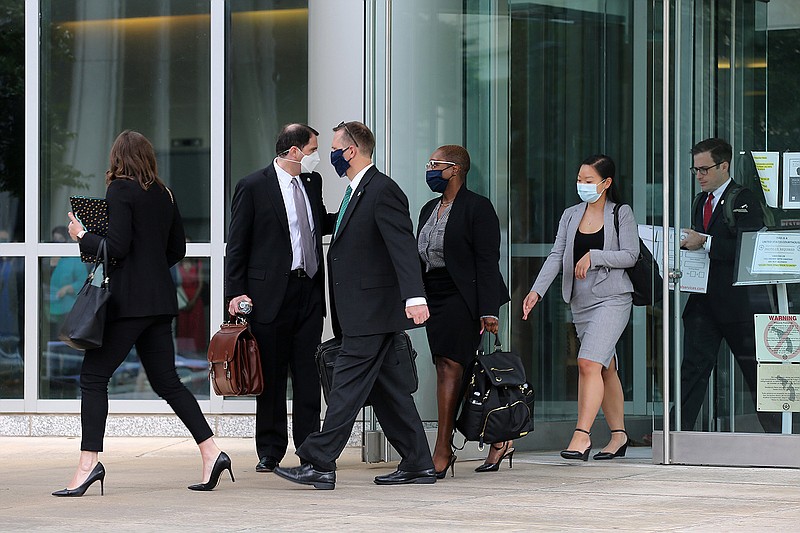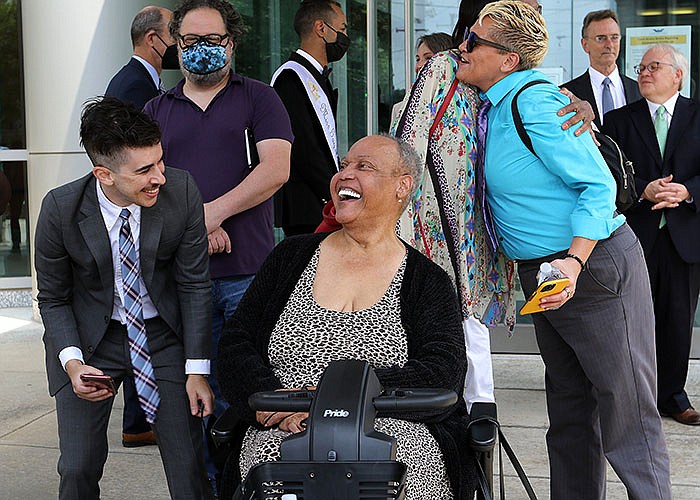In a surprise move Wednesday, a federal judge in Little Rock issued a ruling from the bench to temporarily block an Arkansas law set to go into effect less than a week from now that would ban gender dysphoria treatment for minors and to deny a motion from the state to dismiss the case.
U.S. District Judge James M. Moody made the rare ruling from the bench, he said because of the urgency of the July 28 deadline for the law to go into effect.
"I've been working on this for about a month," he told attorneys for both sides. "I don't want the fact that I'm ruling from the bench to indicate to any side in this lawsuit that it hasn't been well thought out."
Act 626 of 2021 would prohibit doctors from providing or referring transgender young people for medically necessary health care related to the medically recognized condition known as "gender dysphoria." Gender dysphoria is defined by the Mayo Clinic in Rochester, Minn., as the feeling of discomfort or distress that might occur in people whose gender identity differs from their sex at birth or sex-related physical characteristics.
The legislation prohibits the use of hormones and puberty-blocking drugs for young people and gender-affirming surgical procedures, and would prohibit insurance coverage for gender-affirmation treatment for the young and remove any requirement that insurance carriers provide any coverage for gender-affirmation procedures in general. It was passed earlier this year by GOP supermajorities in both the House and Senate, which overrode a veto by Gov. Asa Hutchinson to pass the legislation.
Photo Gallery
Judge Blocks Transgender Youth Treatment Ban
A federal judge blocked Arkansas' transgender youth treatment ban on Wednesday, July 21, 2021, in Little Rock.
[Gallery not loading above? Click here for more photos » arkansasonline.com/722trans/]
A lawsuit filed in May on behalf of four families of transgender young people living in Arkansas by the American Civil Liberties Union alleged that the law unfairly singled out transgender youth on the basis of age and sex, and would prohibit health care professionals from providing or referring transgender young people for medically necessary health care. The ACLU had asked for the preliminary injunction while the lawsuit moves through the federal court system.
Chase Strangio, an ACLU attorney, argued that passage of Act 626 has left transgender minors in Arkansas -- and their parents -- in limbo as the date for implementation closes in.
"These families, like hundreds of others across the state, are terrified," Strangio said. "There has already been a spike in suicide attempts since this legislation was passed."
He pointed out that the procedures targeted by the law for use in gender dysphoria treatment are used to treat other conditions, too, but the only ban on those procedures would be for use to treat gender dysphoria.
"The very treatments banned by the law are permitted when they are prescribed for any other purpose," he said, "including when they are supported by similar or less evidence and even when they carry similar or greater risk.
"Arkansas," he continued, "has decided to single out treatment of gender dysphoria and only treatment of gender dysphoria for a uniquely onerous standard of medical certainty that does not apply to any other form of treatment."
Vincent Wagner, an attorney with the office of Attorney General Leslie Rutledge, argued for dismissal of the lawsuit, challenging the plaintiffs' standing to sue and contending that the law does not discriminate against transgender young people.
Moody questioned Wagner regarding how identical procedures can be targeted based on the intended outcomes, such as testosterone therapy for boys, which the law doesn't address, and testosterone therapy for transgender boys, which the law would prohibit.
"A distinction on the basis of procedure is the true distinction," Wagner said. "It's not a distinction on the basis of transgender status or on the basis of sex."
Saying that treatments for gender dysphoria are experimental, Wagner said the law presents no evidence of discrimination but rather evidence of medical uncertainty.
"It's a distinction on the procedure being performed, not the identity of the person receiving the procedure," he said.
Looking puzzled, Moody delved deeper into the argument.
"Let's go back to the testosterone," the judge said. "Boy wants testosterone, girl wants testosterone. Boy can have it, girl cannot. Why is that not based on sex?"
"The place I'd start is the boy wanting testosterone, what is it being used for ..., " Wagner began.
"No," Moody cut him off. "It's the same, exact treatment. ... Boy wants it. Girl wants it. ... You want to talk about the reason they want it but why is that not discriminatory when we have the same treatment? And you say, but it's for a different purpose. I get that point. I'm not arguing it. I think that's the whole point.
"How do you justify giving the treatment to one sex and not giving it to another and then you say that's not sex discrimination?" Moody asked.
Wagner argued that testosterone therapy is a different procedure depending on whether it is administered to a boy or a girl, continuing to argue the difference between the two is procedural and not discriminatory based on sex.
"But it's the same treatment," Moody said, sounding exasperated. "I've said, for the purposes of this argument, if everyone gets the exact same amount, the same dose in the same manner -- or that's what they're both asking for -- you want to say it's a different procedure because of the perceived desire of why they want it. How does it make it a different procedure just because you want it for one thing and I want it for another?"
In his ruling on Wednesday, Moody said that the risks posed by abrupt cessation of gender dysphoria treatment would create an undue burden on the plaintiffs, whereas the burden to the state posed by blocking implementation of a law that has never been in effect would be minimal. He said a statement by Wagner that the state would likely allow a gradual withdrawal of treatment over a period of weeks amounted to an acknowledgment from the state as to the burden the law would place on the plaintiffs.
"To pull this care midstream from these patients would cause irreparable harm while the status quo for a very long time has been that there is no ban," Moody said. "The notion that the Legislature woke up as soon as the United Kingdom issued a paper saying this is experimental medicine and they needed to rush in and protect these children is not credible to me."
After the hearing, attorneys, plaintiffs and supporters celebrated the victory at a news conference.
Dylan Brandt, 15, a plaintiff in the case, expressed support for other transgender youths in the state.
"We have your back and we will continue to fight on your behalf," he said. "We want you to know that you can be exactly who you are and we should all have freedom to make choices about our medical care with the support of our parents and experts in the field of medicine. And the judge agreed with us today."
Parker Saxton, 16, of Vilonia, also a plaintiff, told the Democrat-Gazette that the path to Wednesday's hearing had been stressful.
"It was scary," he said. "It was just nerve-wracking, it was a lot of waiting, really. This is the first time I've ever done anything like this, really, but we're doing this for everybody who needs it, us and other people in the same situation."
Saxton scoffed at the contention that minors are too young to understand the full import of gender dysphoria treatment.
"We have our own thoughts. It's not like our parents are speaking for us or forcing us into thinking this way," he said. "Most people think parents want this and most parents don't. ... Most trans kids are more mature and as this generation grows we become more mature because we have to."
Saxton's father, Donnie Saxton, said that when he first heard of the bill his reaction was disbelief.
"I just couldn't believe that they were targeting my child," he said. "He was in such a dark place before we started getting this care and to see them basically saying they were going to shut the light switch off, that was hard to take."
Rep. Robin Lundstrum, R-Elm Springs, the sponsor of the original legislation that became Act 626, told the Arkansas Democrat-Gazette that while she was disappointed in the ruling, the injunction would not be the final word.
"The battle to protect children from chemical and surgical castration, which has irreversible consequences for minors -- who cannot possibly understand the long-term effects -- will have a full hearing in court," Lundstrum said. "I'm confident that when the facts come out, all will clearly see the need to protect children from the harms associated with these procedures."
Rutledge, in a statement from her office, called the medical treatments the law would have banned, "experimental with irreversible, physical consequences," and said she will continue to defend the law.
"I will aggressively defend Arkansas's law which strongly limits permanent, life-altering sex changes to adolescents," Rutledge said. "I will not sit idly by while radical groups such as the ACLU use our children as pawns for their own social agenda."
Hutchinson, in a statement released from his office Wednesday, said Moody's ruling is an indication that the law likely will eventually be struck down as too extreme.
"While this is a preliminary ruling, it appears the act will be struck down as unconstitutional for the same reason that I vetoed it," Hutchinson said. "The act was too extreme and did not provide any relief for those young people currently undergoing hormone treatment with the consent of their parents and under the care of a physician. If the act would have been more limited, such as prohibiting sex reassignment surgery for those under 18, then I suspect the outcome would have been different."
Information for this article was contributed by Bill Bowden of the Arkansas Democrat-Gazette.



